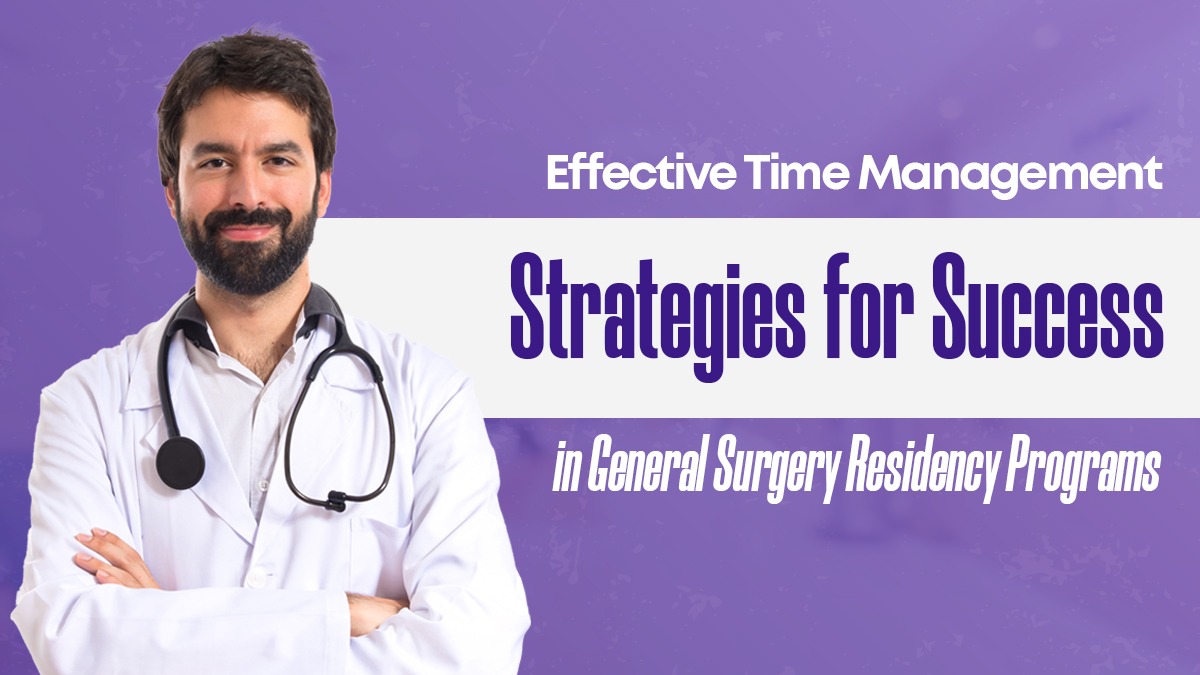Estimated reading time: 5 minutes
Surgery residents need to manage their time effectively. Surgery residency programs are high-pressure activities where surgeons are expected to balance clinical responsibilities with academic learning and personal well-being simultaneously. To help General surgery residents navigate these demands and thrive, here are tips and tricks which will help in the clinical, academic, and personal pressures of a surgical residency program to optimize productivity while maintaining a balanced life.
1. Prioritization Through Goal-Driven Planning
Having clear objectives for both short-term and long-term goals helps to organize day-to-day activities and continue working towards career ambitions. Breaking down large objectives into smaller tasks helps keep the path steady and not too hectic, which is very useful in busy schedules within demanding general surgery residency programs.
2. Mastery of the Art of Scheduling
Creating an effective Scheduling is a very important method for managing the responsibilities involved with a general surgery residency. Here are a few ways to do this effectively:
- Time Management: Use particular times for clinical rounds, study sessions, and personal work. This will ensure less overlap and stress while creating a structured day.
- Weekly Reviews: A weekly review of the schedule set out and the tasks to be carried out in the future enables surgery residents to plan well for high-priority tasks.
- Leverage Technology: Make use of scheduling apps and tools to monitor tasks and send reminders. Digital calendars can sync on devices, hence assisting the residents in general surgery in being organized and on task.
3. Efficient Management in Clinical Responsibilities
Clinical work in a surgery residency program is quite demanding, needs efficient time management.
- Develop Systems: Adherence to checklists and systematic workflows in the care of patients is something that occurs regularly and, hence, improves efficiency.
- Learning from Peers and Mentors: Senior residents and mentors usually have many valuable tips about time-saving clinical practice. Their experience will always help in developing a perfect workflow.
- Delegating Tasks: If such opportunities arise, delegate most of the tasks to fellow members of the health service so that you focus your attention on high-impact tasks.
4. Use Your Time
With busy schedules, it is hard to have time for study and professional development. The surgery resident can make much better use of the short durations:
Micro-learning: One can read the case material or key concepts for brief periods in short intervals. Some websites such as Conceptual Surgery, offering on-the-go learning are great.
Audio learning: During the journey to work, one can listen to podcasts or recorded lectures which will be useful to any student of surgery to help make maximum spare time useful for studying and ensuring that a learner stays current on the clinical knowledge.
Focus on Skill Development: Practical skills are paramount during a surgical residency. Utilize downtime to think about what was done recently or to practice techniques that may anchor learning.
5. Balance Work and Life
While a perfect balance may be challenging, work-life integration is key to the success of a career in surgery.
Set Personal Boundaries: Create boundaries between time for work and personal time to prevent burnout.
Schedule Regular Breaks: Consistent short breaks throughout the day can refresh focus and prevent exhaustion.
Celebrate Small Wins: Recognizing progress, even in minor milestones, helps maintain motivation and positivity throughout the rigorous training.
6. Utilization of Resources for Surgical Residents
Use platforms like Conceptual Surgery which is specifically designed for surgery residents seeking an all-inclusive resource to help navigate the challenges of a surgery residency program. It combines interactive case discussions, real-time live lectures, and a structured curriculum that will fit any surgical residency program. Conceptual Surgery is a masterly designed platform that aims to improve the clinical knowledge base of general surgery residents by fine-tuning their working skills in the operating theatre. Proper work–life integration can be ensured as detailed mock exams, hands-on demonstrations, and video resources are accessible at the resident’s convenience.
So with a learning companion through Conceptual Surgery, there is then the ability of the resident to balance and integrate these clinical duties that come into play with the need to know educational milestones and remain successful in his career in surgery.
Conclusion:
A surgery residency is hard but, given the actual utilization of this concept on time management, the resident will be at par for professional growth, and for his or her being, to remain satisfied professionally. In case one is searching for a reliable source meant to support this task, it should be about checking up with the Conceptual Surgery platform as it stands, the aim is to put together something relevant to surgery residents to utilize in striving for greatness within surgical programs and even establishing a tenured surgery career.

